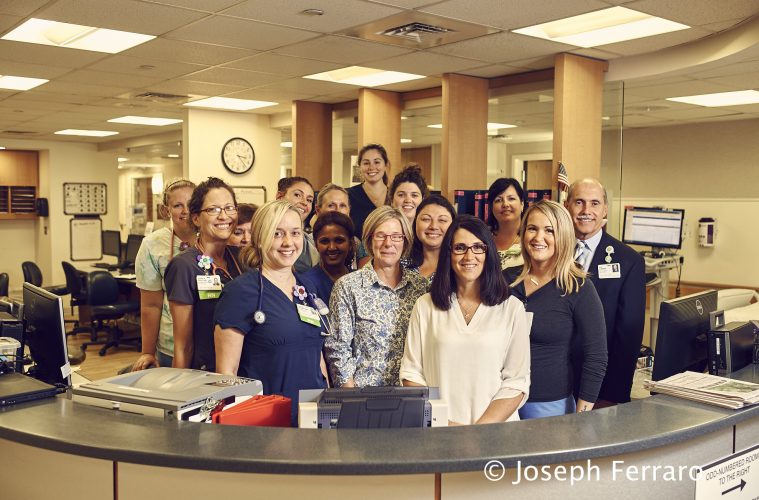At 19, when many people destined for executive management are polishing their partying skills as much as their academic credentials, Phil Cormier was attending college part-time and working in housekeeping at a hospital to help pay tuition. He moved on to a position as an orthopedic technician, but, as Cormier says, “The calling all along was really to management.” It is a very good thing for local healthcare that he listened to that inner voice.
Today Cormier is the CEO of Beverly Hospital, which includes Beverly Hospital, Addison Gilbert Hospital, Bay Ridge Hospital, and Lahey Outpatient Center in Danvers. Together, there are about 2,500 employees as well as 800 physicians. In the four years since Beverly Hospital and its affiliates merged with Lahey Clinic to form Lahey Health System, the institution has experienced positive growth in orthopedic surgery, inpatient care, and maternity care (even as the birthrate in Massachusetts has stalled).
Behind the impressive numbers is Cormier’s staunch belief in the critical importance of community hospitals. “Community hospitals have become the backbone and fabric of the community, supporting local businesses and community endeavors,” Cormier says. “Lahey is making sure patients get quality care at community hospitals.”
Too often, Cormier says, Massachusetts residents have traveled to Boston and its teaching hospitals for routine care, when there are top-flight community hospitals just a few minutes away. His reasoning is supported by fact: Beverly Hospital has been named one of the country’s Top 100 Hospitals seven times (determined from data gathered by Truven Health Analytics). Only two percent of hospitals countrywide have achieved that.
And it was accomplished in the midst of the wild fluctuating healthcare field. “There were 130 hospitals in Massachusetts 25 years ago,” Cormier says. “Now there are fewer than 65.”
“Increasingly, the healthcare world is very complex,” he says. “The reality is that employees must be engaged and involved. No one individual or group has all the solutions.”
Cormier’s success in pacing growth while practicing good fiscal management—balanced with patient care and staff satisfaction—depends on internal mettle, but also knowing where to go for advice. His mentor is Boxford resident Bob Fanning. Before retiring, Fanning held a variety of management positions, including becoming chief operating officer of Boston Children’s Hospital at age 34, and president and CEO of Beverly Hospital at 37.
In June, Fanning received the first Lahey Visionary Award, which includes excellent role modeling in its criteria. “I learned the importance early on of being a people person,” Fanning says, “doing things like making rounds at the hospital, writing a personal note when people did an outstanding job, relating to people at all levels. That’s what I tried to pass on to Phil.” When Cormier left Beverly Hospital in 2007 to work for two for-profit healthcare institutions, Fanning advocated for his return after the Lahey merger in 2012. “I think Phil has done an extraordinarily good job,” Fanning says.
Cormier also cites his wife, Jean Cormier, principal of MDPS, a health information management consulting firm, as an important personal role model. The North Reading residents have been married 27 years.
Cormier’s boyhood may account for his people skills. With a world-traveling dad in the Air Force, Cormier counts nine homes in his childhood. The last one was in Iran, where he attended high school. “It taught me an appreciation for different cultures and customs, how to navigate unfamiliar circumstances,” he says. “It teaches you different viewpoints and concepts.”
One of Cormier’s top tasks is walking the halls of the institutions he serves, where he encourages employees to offer suggestions and ideas. “We never talk politics, but basically everything else,” he says, lightly laughing.
Expansion often follows success, and Cormier has a project on the way: a new maternity floor and postsurgical floor at Beverly Hospital. “As a not-for-profit, we rely on the generosity of the communities we serve,” he says. “This is probably the largest capital campaign we’ve ever embarked on.” The facility’s design and plans for the capital campaign will begin this fall, he says. Patients and family members will be involved in the design and have a say in how families are accommodated.
Cormier is quick to credit his employees from every rung of the ladder. “I’m humbled and honored to be CEO from a personal perspective,” he says. “I meet all the new employees. When I do, I ask them a couple of questions. One is: Why did you choose (this institution)? Their response pretty universally is because they’ve heard it’s a great place to work and a great place to give and receive care. This isn’t prompted. That’s less about me than about the organization.”

